Are you searching for engaging science activities for preschoolers that are both fun and educational? Do you want to spark curiosity and creativity in young minds through hands-on learning? How can we introduce science to preschoolers in a way that excites them while fostering early problem-solving skills?
Science activities for preschoolers are all about discovery! Simple experiments and hands-on activities provide young learners an interactive way to explore the world around them. Whether watching a baking soda volcano erupt, mixing colors to create new ones, or exploring the wonders of magnets, these experiments offer endless opportunities for learning through play. The best part? You don’t need fancy equipment or a science degree—just everyday materials and a spirit of curiosity!
In this article, we’ve compiled 40 fun and easy science experiments for preschoolers that parents, teachers, and caregivers can easily set up at home or in the classroom. These children’s science experiments will introduce concepts like cause and effect, observation, and prediction in a way that captivates young minds. Whether your child is fascinated by water, colors, nature, or chemistry, there’s something for every little scientist to explore.
So, grab your supplies, roll up your sleeves, and get ready for an exciting journey into the world of preschool science projects. Let’s make learning an adventure filled with wonder, excitement, and plenty of “Wow!” moments. Let the fun science experiments begin!

The Power of Science Activities for Preschoolers
Preschoolers are naturally curious. Science activities can harness their desire to explore and understand the world around them. Science activities for preschoolers provide opportunities for children to engage with the world on a deeper level, making observations, asking questions, and experimenting. Children learn about science concepts through these activities and develop vital skills for future learning journeys.
Preschoolers develop a sense of wonder, critical thinking skills, and an understanding of cause and effect by doing simple experiments and interacting with different materials. Whether they observe how water changes state or learn about gravity through simple objects, science activities for preschoolers make learning engaging and meaningful.
Importance & benefits of science activities for preschoolers
Science activities for preschoolers play a crucial role in early childhood development. These activities spark curiosity, encourage exploration, and lay the foundation for critical thinking and problem-solving skills. At this stage, young children are naturally curious and eager to explore their environment—science experiments for preschoolers give them the perfect opportunity to interact with the world and learn through hands-on experiences.
Introducing science activities for preschoolers isn’t just about teaching facts. It’s about fostering a mindset of inquiry. These activities teach children to observe, ask questions, and experiment. By engaging with science projects for preschoolers in a fun, hands-on way, preschoolers begin to understand concepts like classification, comparison, and observation—all while developing a deep love for learning and discovery.

At this stage, easy science experiments for kids also help build foundational skills that support later academic success. By nurturing a scientific mindset early on, we are preparing children for more advanced learning in the future. The key is to make these activities fun and interactive, turning everyday moments into opportunities for exploration. Whether it’s a simple science activity for preschoolers or a more engaging children’s science experiment, every experiment helps nurture their natural curiosity. Let’s take a closer look at why science activities for preschoolers are so important and benefits.

Receive a free catalog and custom layout to help you design your ideal classroom easily.
1. Igniting Curiosity
Science activities for preschoolers are a fantastic way to ignite a child’s curiosity about the world around them. Preschoolers are naturally inquisitive, and science experiments for preschoolers provide them with the perfect opportunity to ask questions and explore their surroundings. Whether observing plants’ growth, experimenting with magnets, or conducting simple science projects for kids, these activities encourage them to investigate and discover how things work. By introducing easy science experiments for kids early on, we nurture their curiosity and help them develop a lifelong love for learning. This early exposure to science sets the foundation for more complex science experiments for 5-year-olds and beyond.
2. Building Problem-Solving Skills
Problem-solving is an essential skill preschoolers will carry with them throughout their lives. Engaging in science activities for preschoolers provides valuable opportunities for young learners to develop problem-solving abilities. These hands-on experiences encourage children to experiment, make predictions, and troubleshoot in a fun and interactive way. For example, when preschoolers participate in simple science projects for preschoolers, they learn how to test different variables and observe how their actions influence outcomes. This trial-and-error process strengthens their critical thinking skills, fosters resilience, and builds persistence. Through engaging preschool science experiments, children develop a mindset of curiosity, experimentation, and problem-solving that will benefit them throughout their academic journey and beyond.

3. Enhancing Fine Motor Skills
Many science activities for preschoolers require physical engagement, such as stirring liquids, measuring materials, or using pipettes. These hands-on tasks naturally develop fine motor skills and hand-eye coordination, which are critical for other areas of learning like writing, drawing, and self-care tasks. With every simple science experiment for preschoolers, children gain more control over their movements and refine their dexterity. By engaging in science for toddlers or preschool science activities, preschoolers can enhance their fine motor skills while learning about the world around them.
4. Fostering Social and Communication Skills
Working on science activities for preschoolers in small groups or pairs allows young children to practice social interactions and communication. When children collaborate on preschool science projects, they learn how to share tools, discuss ideas, and explain their observations. This fosters teamwork and strengthens their ability to communicate and express themselves. Whether it’s a science activity for preschoolers in the classroom or an at-home science experiment for kindergarteners, these activities teach children how to listen, collaborate, and work together towards a common goal, laying the foundation for strong social skills in later years.
5. Developing Early STEM Foundations
Introducing science activities for kids lays the groundwork for STEM (Science, Technology, Engineering, and Mathematics) learning. Early exposure to hands-on experiments helps children develop key skills like observation, experimentation, and understanding basic scientific principles. These activities build confidence and set the stage for more complex STEM concepts as they grow.

Key Scientific Concepts Preschoolers Should Learn
As preschoolers engage in hands-on science activities, they begin to encounter important scientific concepts that will form the foundation of their future education. Science activities for preschoolers introduce concepts like prediction, classification, and measurement, which will serve them well in later years. Below are some key scientific concepts that preschoolers should start to understand through science activities:
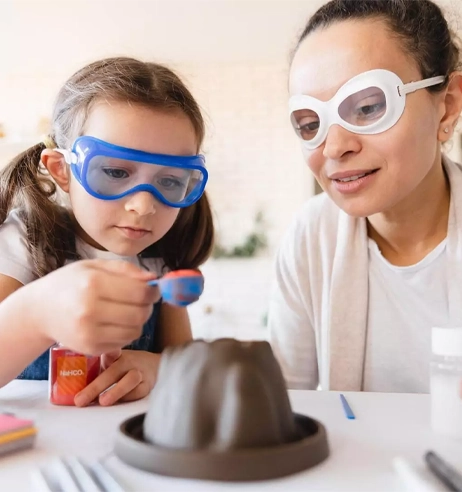
1. Observation
Observation is the foundation of scientific thinking. Preschoolers learn to notice and describe things around them—like the color of a flower or the movement of insects. Science activities for preschoolers help develop strong observation skills, which are crucial for understanding the world and all future learning.
2. Classification
Preschoolers begin grouping objects based on shared traits like shape or color. Science experiments for preschoolers help kids categorize objects like “things that float” or “things that sink,” which sharpens their critical thinking and pattern recognition skills.

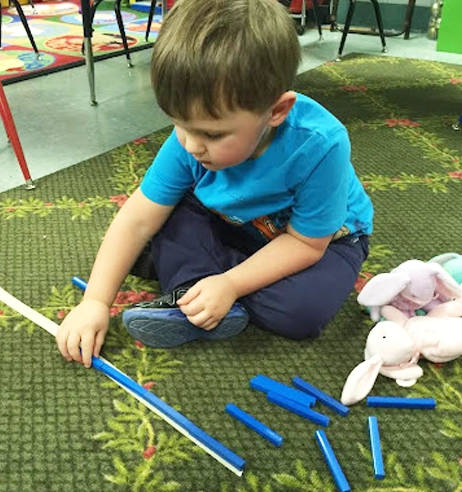
3. Measurement
Measurement is key to both math and science learning. In science activities for preschoolers, kids measure things like length, weight, or volume, learning to associate numbers with real-world objects. Simple experiments often involve measuring, making this concept hands-on and practical.
4. Comparison
Preschoolers compare objects to understand how they are alike or different. Science experiments for sensory exploration might have them compare textures or temperatures. This concept helps them develop reasoning and analytical skills while learning about relationships and differences.
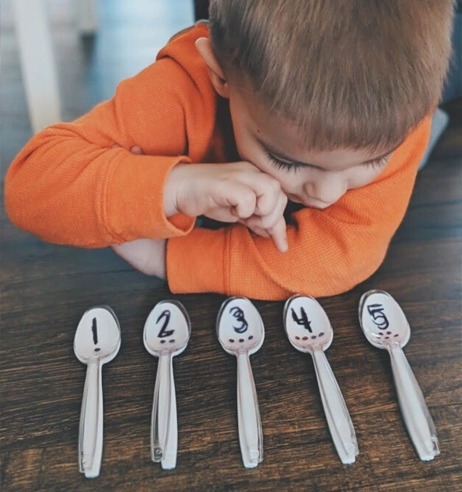
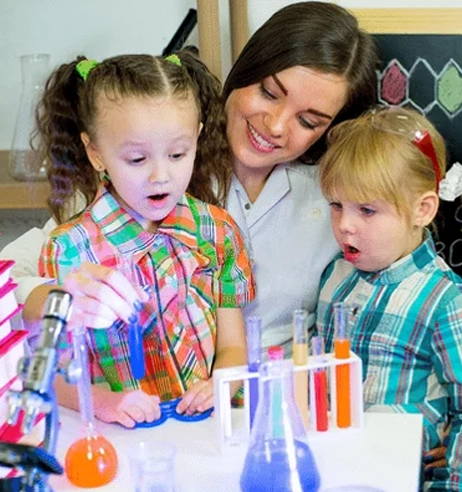
5. Prediction
Encouraging predictions sparks curiosity. Children ask, “What will happen if we do this?” Making predictions in easy science experiments helps preschoolers think critically, fostering a deeper connection to the scientific process and encouraging a love for learning.
6. Inference
Inference is about drawing conclusions from observations. For example, kids might infer that plants need sunlight to grow faster. Preschool science projects help children connect their observations to conclusions, strengthening their critical thinking and problem-solving skills.


7. Communication
Science is about sharing findings. In science activities for preschoolers, kids describe what they’ve learned, enhancing language and communication skills. This fosters collaboration and helps children explain, ask questions, and listen to others.
8. Experimentation
Experimentation is key to scientific inquiry. Simple science experiments for preschoolers teach kids how to test ideas and learn from results. Through trial and error, children develop problem-solving skills and become familiar with the scientific method.

Age-appropriate science activities for preschoolers
When planning science activities for preschoolers, it’s important to consider the child’s developmental stage. Different age groups require different approaches, so tailoring science experiments to match a child’s abilities helps them to better engage with the content. Let’s explore how to break down science activities for kindergarten by age group.
| Age Group | Key Characteristics | Science Activities |
|---|---|---|
| Infants (0-12 months) | Sensory exploration, cause and effect, early motor skills | Sensory bins (feeling textures), water play, sound exploration |
| Toddlers (1-3 years) | Develop basic motor skills, love to mimic, enjoy hands-on play | Playing with sand, observing bubbles, exploring floating vs. sinking |
| Preschoolers (3-5 years) | Curiosity about how things work, ask questions, explore independently | Simple experiments with baking soda and vinegar, watching plant growth, color mixing |
| Kindergarteners (5-6 years) | Able to follow basic instructions, think more logically, problem-solving | Building simple machines (pulley systems), planting seeds and observing, sorting objects based on properties |
Infant Science Activities:
Infants primarily engage with sensory exploration. Simple activities like observing bubbles floating in the air or touching different textures help them begin to understand cause and effect. At this stage, sensory play is essential for building neural pathways and developing early scientific curiosity.
Toddler Science Activities:
Toddlers love to explore their environment and begin to understand basic concepts like gravity, weight, and size. Science activities for toddlers often focus on exploration and cause-and-effect relationships. For example, a toddler can experiment with floating and sinking objects in a tub of water. They may also begin to recognize different colors and shapes as they play with blocks or paint.
Preschool Science Activities:
At the preschool age, children start to engage in more structured science activities. They may begin to understand basic scientific principles, such as how plants grow or how mixing certain liquids results in a chemical reaction. A simple activity, like mixing vinegar and baking soda, teaches them about chemical reactions while also helping them practice measuring and predicting outcomes.
Kindergarten Science Activities:
Kindergarteners are able to follow instructions and engage in more complex experiments. Activities at this stage often include sorting and classifying, understanding basic physics concepts (like motion), and beginning to use the scientific method to experiment and observe results. For example, building a simple pulley system or planting seeds and tracking their growth can provide valuable insights into basic engineering and biology concepts.

Receive a free catalog and custom layout to help you design your ideal classroom easily.
What Are Some Science Activities for Preschoolers?
Here’s where we dive into science activities for preschoolers—40 activities to inspire young minds! These activities are designed to be engaging, educational, and fun, covering a variety of scientific concepts such as observation, measurement, and exploration.
Science Activities for Sensory Exploration
Sensory activities are crucial for preschoolers as they help children understand their environment through touch, smell, sight, hearing, and taste. Here are some sensory-based science experiments:
1. Sink or Float Experiment
Fill a tub with water and have children guess whether various objects will sink or float. Use common household items, such as spoons, rocks, and plastic toys, to make predictions and test them. This science activity for preschoolers helps them understand buoyancy and fosters curiosity about the physical properties of everyday objects. By engaging in hands-on experiments like this, preschoolers begin to grasp foundational science concepts in a fun and interactive way.
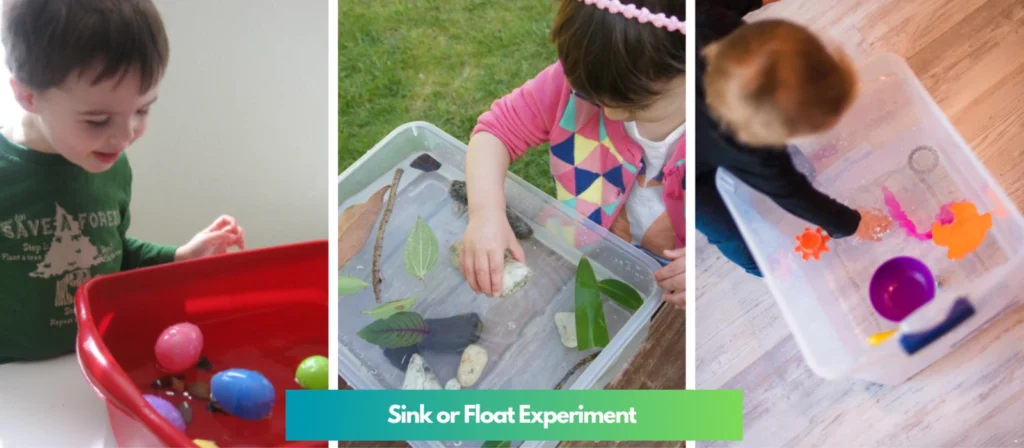
2. Touch and Feel Sensory Bins
Create sensory bins with rice, sand, or fabric and let children explore different textures. Discuss how these materials feel (rough, smooth, cold, warm).
3. Ice Cube Melting
Freeze small objects like plastic animals or flowers inside ice cubes. Once frozen, place them in a shallow dish and let children observe as they melt. Discuss how heat affects solids and liquids, introducing basic concepts of temperature and states of matter. The science activities for preschoolers spark curiosity and enhances understanding of cause and effect. Through this hands-on experiment, children gain insight into physical changes, building a foundation for future scientific learning.
4. Smell Exploration
Use different jars with aromatic substances like vanilla, cinnamon, or citrus and ask children to smell them and describe the scents.
5. Sound Exploration
Fill various containers with different materials like pebbles, beads, or rice. Let children shake the containers and explore the different sounds each makes. Ask them which produces the loudest or softest sound and why. The science activities for preschoolers help children understand the relationship between objects and sound, introducing concepts like vibration and noise levels. By engaging in this hands-on science activity for preschoolers, children also develop sensory awareness, which enhances their problem-solving and critical thinking skills, all while having fun with sound exploration.
6. Colorful Water Play
Fill clear cups with water and add food coloring to each one. Let children explore mixing the different colors to see what new colors they can create. Science activities for preschoolers like this encourage early experimentation with colors and introduce basic concepts of color theory and cause-and-effect relationships.
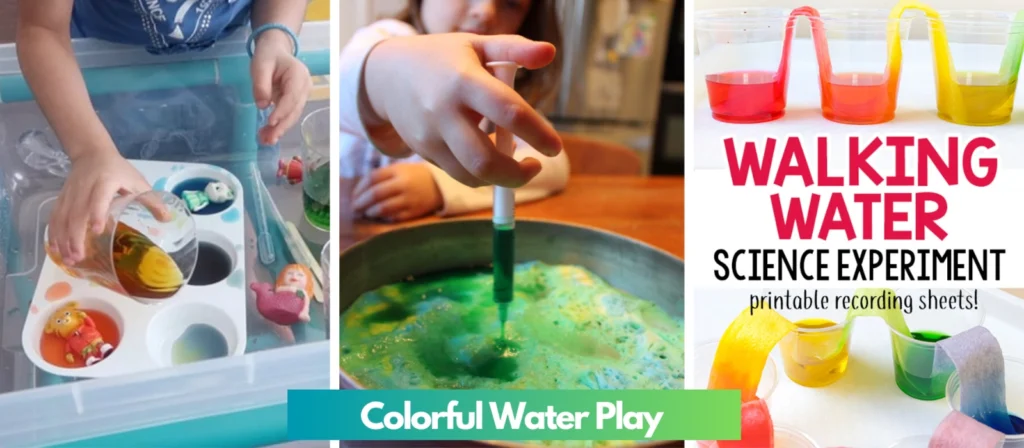
7. Blowing Bubbles
Blow bubbles and let children catch them. Discuss the properties of bubbles and how they change when popped or when floating.
8. Texture Scavenger Hunt
Go outside or around the house and gather materials with different textures (soft, rough, bumpy). Let kids feel and compare them.
9. Cold and Warm Sensations
Fill a bowl with warm water and another with cold water. Ask children to dip their hands in both and describe the differences in temperature.
10. Waterfall Sensory Bin
Fill a bin with water and provide small cups and spoons. Let children explore how water flows and splashes as they pour it from one container to another.
Science Activities for Outdoor Learning
Outdoor exploration is essential for preschoolers as it encourages curiosity about nature and science. Here are some fun outdoor experiments:
11. Nature Walk Exploration
Take a walk in nature and encourage children to observe and collect leaves, flowers, or rocks. Discuss their findings and the environment they came from.
12. Planting Seeds
Help children plant seeds in small pots and observe their growth over time. This teaches them about the life cycle of plants.
13. Making a Rain Gauge
Create a simple rain gauge using a clear plastic bottle, a ruler, and markers. Place it outside before it rains and measure the collected water afterward. Record the results over several days to observe weather patterns. Preschool science experiments like this introduce early measurement skills and basic meteorology concepts.

14. Shadow Play
Use the sun or a flashlight to explore shadows. Ask children to observe how shadows change with the time of day or the position of objects.
15. Bug Hunt
Take preschoolers outside to search for insects in the grass, under rocks, or on tree leaves. Use magnifying glasses to observe their size, color, and movement. Discuss their habitats, roles in nature, and how they help the environment. Science activities for preschoolers like this encourage curiosity, observation skills, and a love for nature.
16. Rock Sorting
Collect different rocks of various sizes and colors. Let children sort them by size, shape, or color and discuss the characteristics of each.
17. Plant Observations
Create a small garden in your backyard or use pots indoors. Have children plant seeds, water them regularly, and track their growth in a journal. Discuss how sunlight, water, and soil help plants grow. Science activities for preschoolers like this teach patience, responsibility, and the basics of plant life cycles.

18. Bird Watching
Spend time outdoors observing local birds. Let children use binoculars or just their eyes to identify the birds and learn about different species.
19. Building a Nature Collage
Collect leaves, flowers, and small twigs during a walk, and encourage children to create a nature collage. Discuss the different types of plants and their functions.
20. Exploring Wind
Use kites or flags to show how wind works. Discuss how wind is created and let children feel the breeze on their faces.
Science Activities for Indoor Learning
If you’re stuck inside or the weather isn’t ideal for outdoor play, these indoor science activities are a great way to explore scientific principles:
21. Baking Soda and Vinegar Volcano
Create an erupting volcano with baking soda and vinegar. Watch as the fizzing reaction helps preschoolers understand chemical reactions.
22. Making Homemade Slime
Create a simple slime mixture with glue and borax. Discuss the change in states of matter (from liquid to solid) as they explore the texture of the slime.
23. Color Mixing with Paint
Use primary-colored paints and let children mix them to create secondary colors. Discuss how red, yellow, and blue form orange, green, and purple. Encourage them to predict the results before mixing. Science activities for preschoolers like this enhance creativity, sensory exploration, and early color recognition skills.

24. Magnet Exploration
Provide different magnets and let children experiment with attracting or repelling various objects. Discuss the concept of magnetism.
25. Dissolving Salt Experiment
Fill a glass with warm water and salt. Allow children to watch the salt dissolve and discuss how water can dissolve certain materials.
26. Tornado in a Bottle
Fill one plastic bottle with water, securely connect it to another empty bottle using tape, and swirl the top bottle in a circular motion. Watch as a vortex forms, mimicking a real tornado. Science activities for preschoolers like this introduce concepts of motion, gravity, and fluid dynamics in an exciting, hands-on way.
27. Grow Crystals
Grow crystals using salt or sugar and warm water. Watch as the crystals form and explain how crystals are made.
28. Bubble Exploration
Blowing bubbles is a fun way to explore surface tension and air movement. Try using different types of soap or adding ingredients like glycerin to see which solution creates the biggest or longest-lasting bubbles. Science activities for preschoolers like this help children observe how air gets trapped in liquid film, forming beautiful, floating spheres.
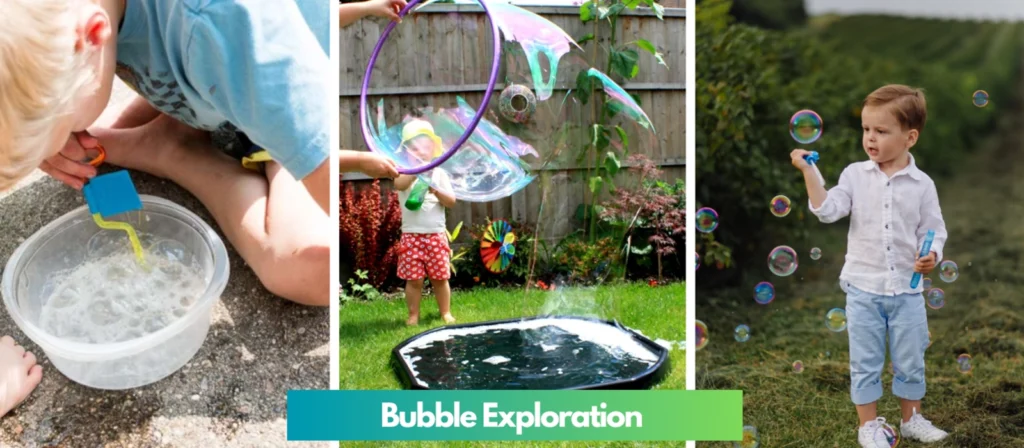
29. Density Tower
Fill a clear jar with liquids of different densities (e.g., oil, water, and syrup) and let children observe how they layer without mixing.
30. Static Electricity with Balloons
Rub a balloon on your hair and then hold it near small pieces of paper to show how static electricity works.
Science Activities for Developing Critical Thinking Skills
Critical thinking is important for preschoolers to learn problem-solving skills. These activities will engage them in using their observation and reasoning skills:
31. How Things Move
Create a ramp with different materials (cardboard, wood, etc.). Let children roll various objects down the ramp and observe how fast or slow they move.
32. Matching Animal Tracks
Create or buy rubber animal track stamps and press them into sand, clay, or paint. Have children match each track to the correct animal and discuss how different animals move. Science activities for preschoolers like this help develop observation skills, critical thinking, and an early understanding of animal biology and habitats.

33. Sorting Objects by Properties
Provide a variety of objects (buttons, coins, fruits) and ask children to sort them by properties such as size, shape, or color.
34. Building Bridges with Blocks
Challenge children to build a bridge that can hold a toy car. They will need to use critical thinking to find out which materials work best.
35. Predicting the Weather
Use everyday tools like a thermometer and a weather vane to observe the weather. Encourage children to predict the weather based on their observations.
36. Water Cycle in a Bag
Fill a bag with water, tape it to a window, and let children observe condensation and evaporation as the sun heats the water.
37. Problem-Solving with Puzzles
Use puzzles to encourage children to think critically and solve problems. As they work through puzzles, they practice logic and reasoning.
38. Building a Simple Machine
Introduce preschoolers to the concept of simple machines (levers, pulleys) and have them build their own versions using household materials.

39. What Will Happen Next?
Create an experiment where children predict what will happen next (e.g., mixing two liquids) and then test their hypotheses.
40. Shape Sorting with Shape Blocks
Use blocks or cut-out shapes and challenge children to sort them by size or shape. Discuss how different shapes work together to form new structures.
These 40 science activities for preschoolers are designed to foster curiosity, critical thinking, and a love for learning. By engaging in these fun and educational experiments, children not only explore the wonders of science but also develop essential skills that will serve them throughout their educational journey and beyond. Happy experimenting!

Receive a free catalog and custom layout to help you design your ideal classroom easily.
Safety tips for conducting science activities with preschoolers
Safety should always be a top priority when conducting science experiments with preschoolers. Here are some essential safety tips for conducting science activities for preschoolers:
- Supervision is Key
Always supervise young children during science activities, especially when handling small objects, liquids, or chemicals. - Use Non-Toxic Materials
When possible, choose nontoxic, child-safe materials, and ensure that any chemicals or substances used are appropriate for young children. - Avoid Small Parts for Young Kids
Ensure that any items used in experiments are large enough that they can’t be swallowed or pose a choking hazard. - Proper Hygiene
Encourage children to wash their hands before and after conducting experiments to prevent the spread of germs and avoid contact with potentially harmful substances. - Teach Basic Safety Protocols
Introduce basic safety rules, such as not touching hot items, not smelling substances directly, and using tools carefully.

Frequently Asked Questions About Science Activities for Preschoolers
What are examples of appropriate science activities for preschoolers?
Appropriate science activities for preschoolers are simple, hands-on, and sensory-rich. Examples include the baking soda and vinegar volcano, sink or float experiments, growing seeds in a cup, exploring magnets, color mixing with water and food coloring, and watching ice melt with salt. These activities encourage observation, prediction, and curiosity while being safe and engaging for young learners.
How do you teach science to preschoolers?
Teaching science to preschoolers starts with play-based exploration. Use real-world objects and everyday experiences to introduce scientific ideas. Ask open-ended questions, encourage them to make guesses, and let them explore through touch, sight, and movement. Short, interactive science activities—like watching a plant grow or experimenting with water—help make abstract concepts more concrete for young minds.
What science skills should a 4-year-old have?
By age 4, children should begin to demonstrate basic science skills such as observing changes, asking “why” questions, making simple predictions, sorting objects by properties (like size or color), and understanding cause and effect. Through regular science activities for preschoolers, they also start learning to compare, measure, and describe what they see, hear, or feel.
What are examples of science in early childhood?
Science in early childhood shows up in everyday moments: noticing how rain falls, mixing colors during art time, exploring bugs in the garden, or figuring out why some toys float in the tub. These experiences are examples of early scientific thinking. Structured science activities for preschoolers—like planting seeds, melting ice, or creating simple chemical reactions—help reinforce these natural discoveries through guided exploration.
Conclusion: Encouraging a love for science in preschoolers
Science activities for preschoolers are more than just fun experiments—they are essential tools for building curiosity, critical thinking, and foundational STEM skills. Through hands-on science experiments for kids, young learners develop problem-solving abilities, observation skills, and an appreciation for the natural world. These simple science experiments for preschoolers provide opportunities to ask questions, test ideas, and explore the scientific method engagingly and interactively.
At TOP Montessoris, we believe that science for preschoolers should be accessible, engaging, and developmentally appropriate. As a trusted supplier of Montessori & Reggio-inspired preschool furniture and educational materials, we support early childhood educators, daycare centers, and kindergartens by providing high-quality, safe, and affordable classroom furniture designed to create stimulating learning environments. Our carefully crafted furniture and play-based materials encourage exploration, discovery, and hands-on learning, making them perfect for preschool science activities and classroom experiments.








